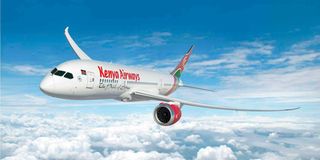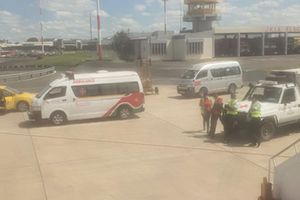
A Kenya Airways aircraft.
A committee of the National Assembly has clashed with the National Treasury over the government’s continued repayment of a Sh58 billion guaranteed for Kenya Airways (KQ) even after the airline posted “profits” in the ended financial year.
Members of the Public Debt and Privatisation Committee of the National Assembly said that the national carrier is now on a profit-making course and should be left to take full responsibility for its debt obligations.
National Treasury Principal Secretary Chris Kiptoo, however, dismissed the KQ profit talk as “nothing but forex movement that has lifted the airline’s fortunes”.
The profit puzzle
The committee members- Mr Mohamed Daudi (Wajir East) and Mr Thuku Kwenya (Kinangop)- demanded that KQ, which is partly owned by the government of Kenya to the tune of 48 per cent with 52 per cent owned by private entities should own up to its debt obligations.
“Why pay debts for someone who is making a profit? KQ has been boasting about how it is making profits. So why pay their debts?” posed Mr Daudi.
Mr Kwenya noted that the government’s takeover of KQ debt repayment is an abuse of what the Constitution and the laws of Kenya define as a guaranteed debt.
“An entity that is making a profit and has a private holding component, who enjoys dividends should take responsibility and repay its own debts,” said Mr Kwenya.
In March 2025, KQ posted its first full-year profit after 12 years of losses, buoyed by foreign exchange gains.
The airline posted an all-time high net profit of Sh5.4 billion for 2024. The airline reversed a loss of Sh22.6 billion in 2023 to set a historic record profit after it realised Sh1.2 billion in foreign currency exchange gains from a loss of Sh19 billion in the prior year.
“It is wrong to use taxpayers’ money to repay debts of an entity that is partly privately owned. It is unacceptable and we must not allow ourselves to be seen abusing the taxes Kenyans pay,” added Mr Kwenya.
Kenya Airways (KQ) secured a loan from the US Exim Bank in 2017, guaranteed by the Kenyan government, to purchase aircraft.
The airline repaid part of the loan before the financial difficulties struck in 2020 which was worsened by the Covid-19 outbreak that saw KQ default on the loan, prompting the government through a novation plan, to step in in 2022.
The government's intervention included taking over part of the guaranteed loan to prevent further defaults.
However, Dr Kiptoo told the committee members not to read so much into the profit figures while reminding them that the repayment of the KQ’s government-guaranteed debt, which was triggered by financial challenges, was approved by the National Assembly where the committee members sit.
“There was no real profit. What appears to you as profit is actually exchange rate movement in favour of KQ,” Dr Kiptoo told the committee as he justified the repayment on account that KQ anchors “our country as a tourism hub and also promotes our exports.”
Treasury's defense
The Treasury PS went on to remind the committee that the repayment of KQ debt is in line with the Public Finance Management (PFM) Act and that it is not the first time the government has come in for a State agency citing the case of Kenya Power.
Dr Kiptoo said that the National Treasury approved the KQ debt repayment in 2022 “which means it became our responsibility,” after the national carrier faced challenges.
Section 61 (2) of the PFM Act states that the Cabinet Secretary for National Treasury may agree with the borrower to pay the debt over that period and at such intervals and subject to such terms and conditions as may be specific in the agreement.
However, the committee members were not satisfied with the PS’ justification noting that the loan amounts may have been abused.
“Borrowed funds are supposed to go towards development-oriented projects. If the amounts are diverted to other uses like recurrent expenditures, then problems come in,” said Mr Kwenya.






